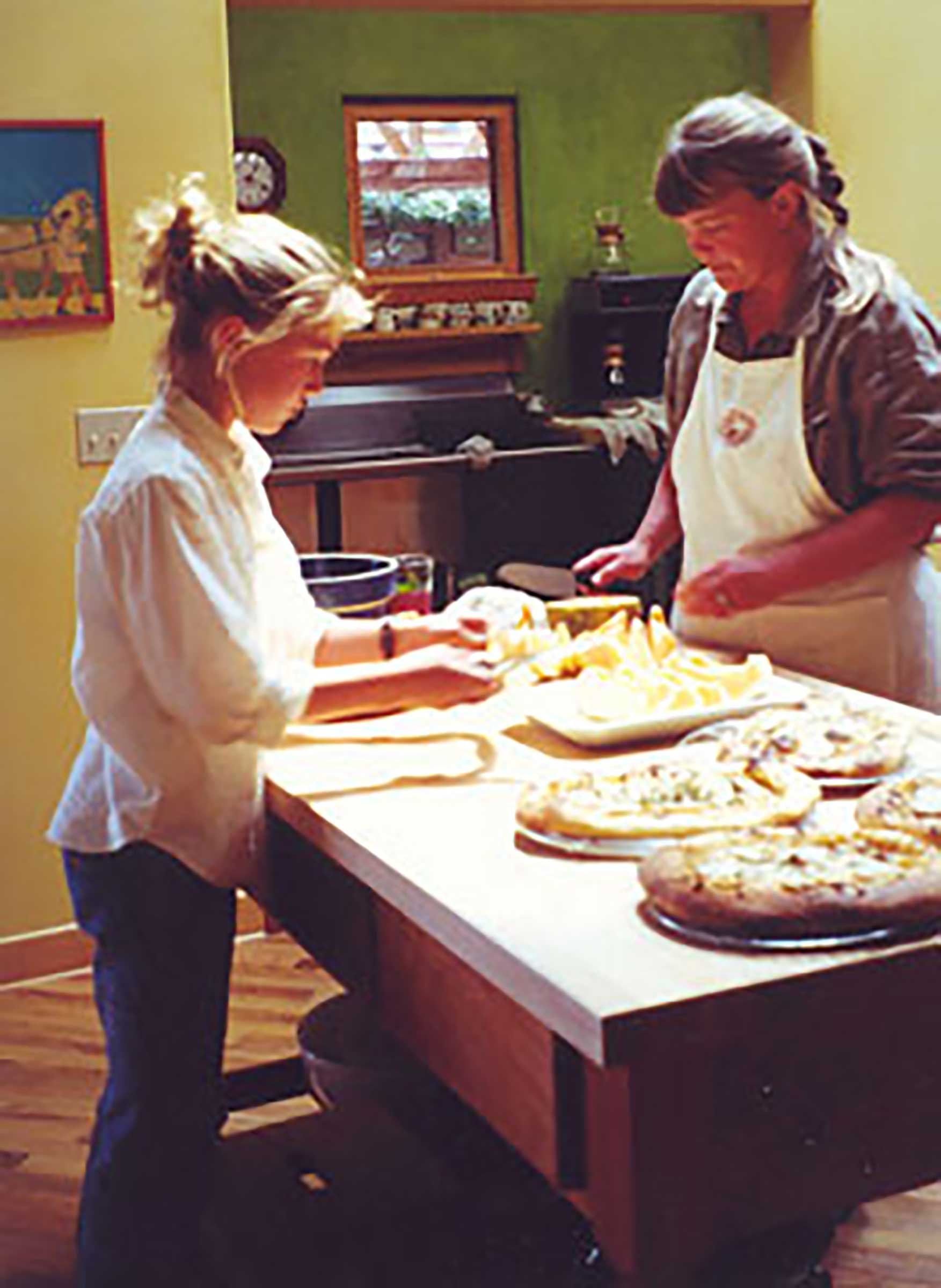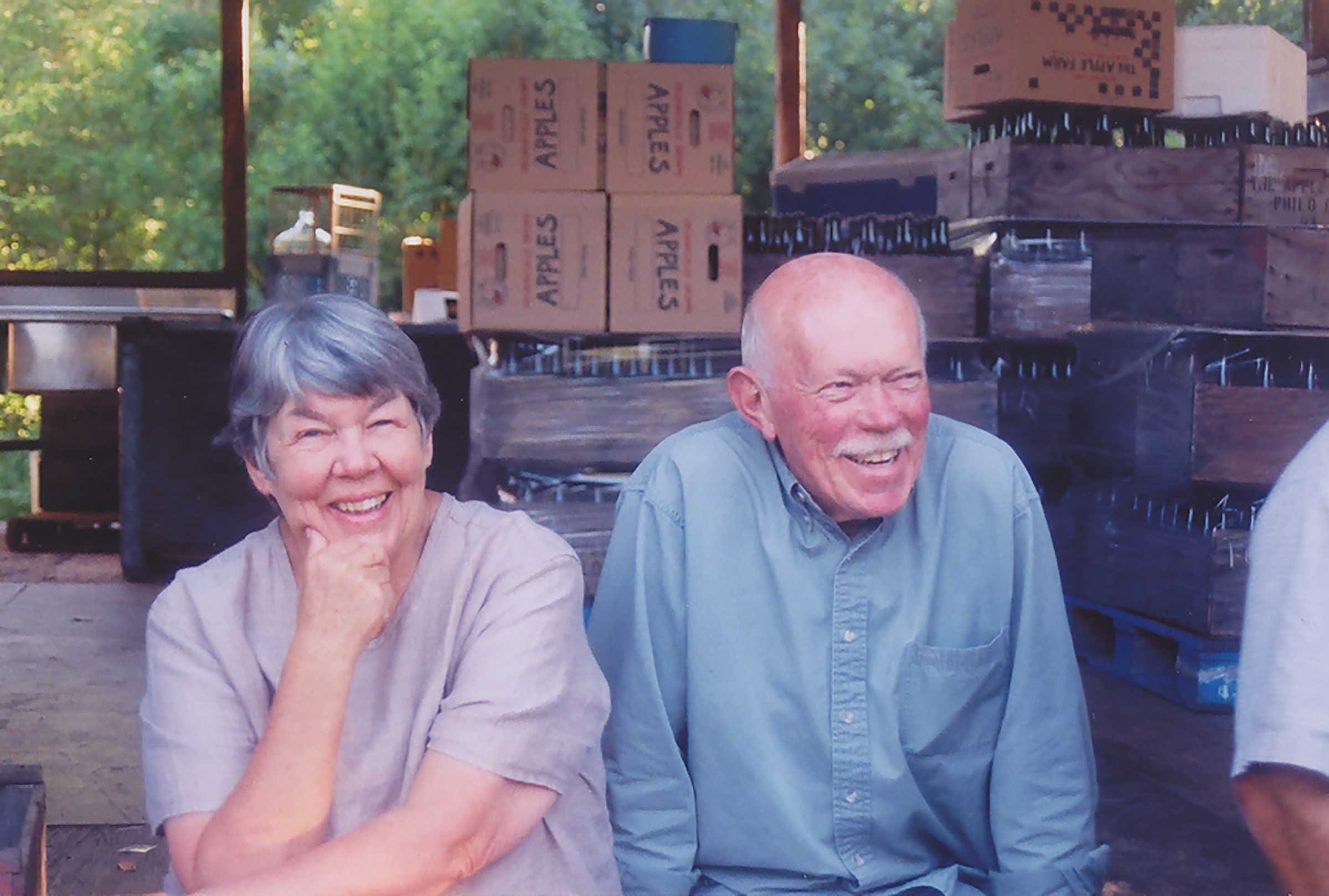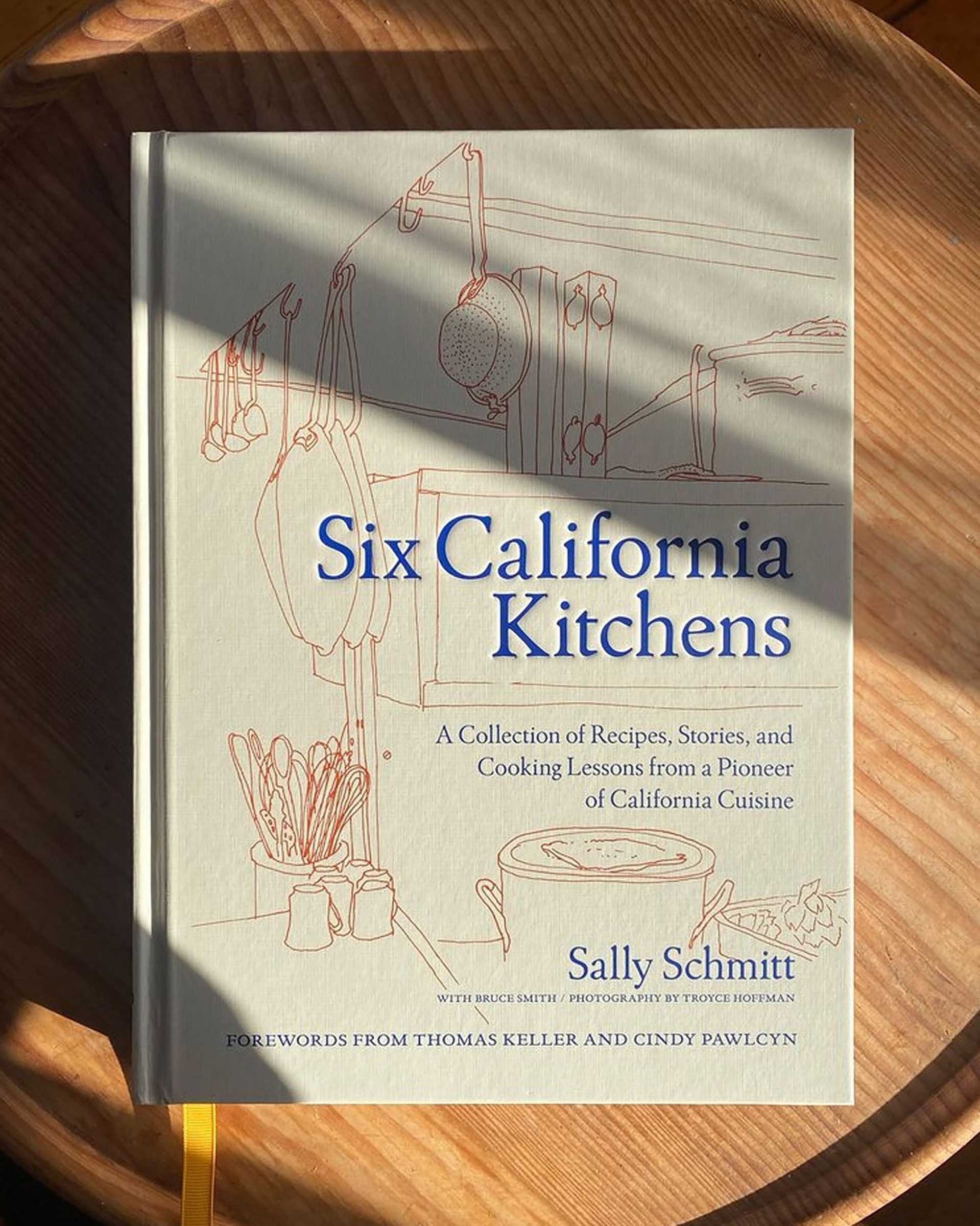Living the Legacy

Sally Schmitt’s Granddaughter Reflects on Lessons Learned
by Polly Bates
When I was little, every so often I and my younger sister, Rita, would venture “up front” to our grandparents’ house at the entrance to The Apple Farm for a sleepover. We would push the couches together to make a giant nest to play and eventually sleep in, and challenge Grandma Sally to never-ending rounds of fast-paced card games. She usually destroyed us. Later on, as Grandpa Don prepared apple juice spritzers (we were still too young for wine coolers), we would help Grandma as she indulged our young, simple palates by making what we lovingly called “Creetzas.” This delicacy consisted of stone ground crackers with our favorite Jack cheese from Lemon’s Market melted on top, as if it were a pizza. Simple. Local. Delicious. I’m sure they ate something else for dinner themselves, but the Creetzas stand out for me because, in retrospect, it’s hilarious that our renowned gourmet chef of a grandmother would make such a thing. Yet, it’s also telling because I would still describe her food in the same way—simple, local, and as fresh as possible.
My grandparents first made their mark on the food world in Yountville, Napa Valley, where they managed the Vintage 1870 building. It started as a “shopping arcade” that featured handpicked local artists and supported many first-time business owners, but it soon expanded to include my grandmother’s cafe and later her restaurant, The Chutney Kitchen. Sally’s food became very popular, and eventually they purchased an old building where she could create a restaurant that truly reflected her vision—the celebrated French Laundry. I don’t remember much from those days besides running around the gardens, trying to ride in the dumbwaiter, and playing with my grandpa’s orange slice boats in their hot tub when we visited. Yet, even at that age, I had a sense that the community they were cultivating and the food experience they offered were a special endeavor that would influence the trajectory of many lives.
In 1984, my grandparents purchased The Apple Farm in Philo, an old, rather run-down 32-acre farm, as a place to eventually retire. They asked my parents, Karen and Tim Bates, if they would like to try their hand at farming apples. So my parents moved to the property with my two older siblings, and have since spent nearly 40 years reviving the original orchard and adding almost 80 heirloom apple varieties to it. They became pioneers in organic and biodynamic farming, and soon I, and later my sister Rita, joined the pack of kids running around the orchard.
When my grandparents finally moved to the farm in 1993, the welcoming spirit that had surrounded The French Laundry came with them. They built a commercial kitchen, four guest rooms, and a home for themselves off the end of the old barn. From the moment it was built, the “big kitchen,” as we called it, was always overflowing with some tantalizing smell. No one on the property could stay away for long. Once you came near, you would inevitably get roped into some task: sifting flour for baking, cracking apricot pits to extract the kernel for jam, or washing the never-ending dishes. We didn’t mind, though. We wanted to be around whatever magic Sally was cooking up in there. It was like we all floated around the edges, putting little pieces of the puzzle together, which she would eventually gather up and fit into the frame she’d made. The final result would always be a delicious creation of such beauty and delight. I remember our family always saying, “Some people eat to live, but we live to eat.”
As a teenager, I spent many nights helping my mother and grandmother execute the cooking lessons we offered out of that kitchen. Those lessons allowed my grandmother to continue sharing her love of cooking and food philosophy with our guests without the daily demands of running a restaurant. I didn’t always love being there, cleaning up the mess of a bunch of adult strangers, but now I wish I’d paid more attention to all the little culinary details that were imparted. Luckily, I still managed to learn a lot “by osmosis,” as my mom says. Sally had a stern but gentle way of teaching. Mistakes were quickly corrected, but there were always more opportunities to try again and get it right in her kitchens. I now know, though, that the most important lessons I learned from her were not actually about food at all.
A legacy cannot be established in just one generation. It is a build-up of small acts of love over time. Sometimes we don’t even realize what we are part of until someone from the outside helps us see it with fresh eyes.
A few years ago I was working as a mentor at an arts-based youth camp in Oregon, when Sola, one of the program facilitators, asked how I’d arrived at this work. I didn’t have a clear answer at first, but my family’s farm came up, as well as the fact that everyone on my mother’s side was some sort of creative entrepreneur. I knew that I was, too, but my calling to the performance arts had always felt like it didn’t quite fit—like it was too sparkly and urban to be put in the same category as running a small farm, restaurant, flower business, or arts and crafts furniture company. My work friend wanted to know, “Where did that entrepreneurial spirit come from? None of those are easy things to do, so surely there was some encouragement or support coming from somewhere?”
My mind immediately jumped to a conversation I’d had with my Aunt Kathy and my Uncle Bill. I was trying to help my Grandmother Sally with her cookbook memoir project—a brilliant but often overwhelming undertaking instigated by my cousin Byron on Sally’s 80th birthday. It had become a little stagnant due to busy lives and the recent passing of my dear Grandfather Don. I had some time on my hands and thought I would take a crack at trying to help keep the project moving forward. Byron and his brother, Troyce, had already taken a ton of beautiful photos and laid out the design, and my grandmother had written a lot, but it needed more structure. My enthusiasm about the project reignited Sally’s excitement, and I took a heavy box of manuscripts home to sort through them.
In reading the manuscripts, I realized that Grandma Sally was so humble that it would be hard to convey the true impact of her life through her words alone. Byron had done a lot of interviews with her old staff members that were very revealing, but I wanted to find a way to include more of her five children’s perspectives. So I sat down with her daughter Kathy (and Kathy’s husband, Bill) to learn more about my grandparents. Bill, who came into the family as an employee first, described them as truly self-effacing (because “the ultimate in being impolite was to blow your own horn”) and private, unlike the generations of today who live their lives so publicly online. They would never share when they were in a challenging financial situation or needed help, but the things they did share through their actions deeply impacted a whole community of young people.
My Grandpa Don was a true storyteller and a powerful but humble public figure. He loved people and was an incredible host, and, according to Bill, he believed that “if you nurtured people, they could do great things.” I remember getting small tastes of this from him in the rare moments I got him alone. At one point he handed the Apple Farm Napa deliveries over to me and took me along to show me the route. Hearing his stories about his connection to each restaurant and chef we visited, and seeing his pride when he introduced me, showed me how much he invested in building relationships in his communities and bringing people together. He was known as the ultimate host—always ready to top off your wine glass with the best the region could offer.
My grandmother’s way was much less direct. Kathy described her as often having an impact on people without realizing it. “She had confidence and instilled that in all of us.” There was a whole group of young folks who became adults in her kitchens, where it was “expected that you jump in and help where it was needed,” Kathy shared. “In that process, you learn about everything and become better at creating the end product if you’re involved the whole way. And that’s what makes it more fun and interactive for everyone.” So many of them left there well equipped to start their own successful projects.
Kathy described how she was able to easily transition into building her own floral business by incorporating the little lessons her parents had taught her while she was growing up in and around the Vintage 1870 and the French Laundry. She just felt like she naturally knew what to do and how to understand every angle of the business and how to bring her employees along. Kathy put it this way: “They gave us a base and a fundamental training that all of us used,” but they also “let us feel our way; they didn’t come down on us for not making certain choices. I think that’s what makes our family a little unusual—we are not afraid to always be exploring or trying something new.”
As I recalled that conversation and was describing my grandparents to Sola, I realized that every single one of their family members had inherited not only their confidence, but also their desire to pass that forward, to instill it in others through their own form of mentorship. My parents were no exception. They had taken on the operation of the Apple Farm with very little knowledge of apples, and were not only doing an incredible job at maintaining and evolving the farm, supporting and eventually taking over the cooking experiences and the event space, but for years they had also been bringing us (their four children) along in the process. On top of that, they had also been taking on young “farmhands” interested in learning farming skills and welcoming them into our home and family. They were mentors in the deepest sense of the word, carrying forth my grandparents’ philosophy that, “It’s not just about teaching people a specific skill—it’s a whole sense of community and sharing a table together that makes an experience valuable.”
This was exactly what I had been learning through mentoring at these camps as well. It wasn’t specifically about the dance skills, stilt lessons, or sewing techniques I taught these youth. It was about the community we could create when we all came together to share, and the inspiration and confidence they could also bring to the table when they felt held, heard, and cared for by those that came before them. Identifying this characteristic in my grandparents allowed me to recognize and acknowledge how my path and my life choices fit into a framework that is so much bigger than me.
In this last year, I had the honor of caring for my grandmother and helping her build physical strength (using my personal training skills) to retain her independence and mobility as much as possible. It was so challenging for all of us to experience her health and autonomy shift, but it was also incredible to see how four generations of family came together to care for her. She was able to celebrate her 90th birthday in good health, hold her incredible cookbook memoir, Six California Kitchens, in her hands, and share it with all of us. I was blessed with the opportunity to be there with her, holding those marvelous hands, as she transitioned out of this physical world.
One evening after we did her exercises, I prepared a simple goat cheese and spinach dinner omelet for us in the way she’d lovingly taught me when I visited their home in Elk. I will forever think of her when I eat omelets. Simple (but requiring good technique). Local (cheese from our goats, eggs from our hens). Delicious (if you think omelets aren’t for dinner, think again). When we sat down to eat, I asked if she and Grandpa realized the legacy they were creating for our family as it was happening. In her characteristic modest manner, she chalked it up to luck and good timing. I’ll admit I was a little shocked. I’d created this story in my head that my grandparents had planned this thing out from the start, had seen the run-down farm they bought in all its potential glory, and had clearly imagined passing this land on to the next generations. If you take a look around The Apple Farm today, and the beautiful family compound it has become over the years in addition to everything else it produces, you might recognize, like Sola did and like I do, that there was a little more to it than just luck and timing.
All those little acts of risk-taking, of teaching, of hosting, of feeding, of encouraging, of sharing what they had, and of mentoring added up to something much more. I still call it a legacy, even though Grandma Sally may have been too humble to claim that word. I am so honored to call them family, but more importantly, I am in awe of the way that everyone who spent time with my grandparents was left with the tools, knowledge, and desire to continue and expand upon their legacy in their own unique way.
The Apple Farm
18501 Greenwood Road, Philo | PhiloAppleFarm.com
All photos courtesy of The Apple Farm
Polly Bates currently splits her time between The Apple Farm, where she is the Director of Communications, and Oakland, where she runs her own wellness and entertainment company called Daring Arts Movement. She is passionate about travel, dance, functional fitness, and working with youth to build sustainable practices and systems for a better world.



